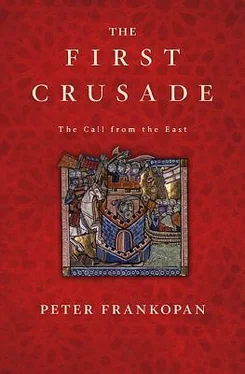Violence was directed particularly at the capital’s elites. Senators were pulled from their horses; some were stripped naked and left humiliated in the street. 35The emperor himself yielded meekly as he slunk away from the palace, his imperial vestments stolen by courtiers who put them on and mocked him. 36Captured and handed over to the Komnenoi, Nikephoros was placed in a monastery where he is reported to have taken to the life of prayer and contemplation – although he was not impressed by the strict vegetarian regime on offer. 37
Soon after taking control of the city, Alexios I Komnenos was crowned emperor of the Romans in the Great Church of St Sophia in Constantinople. The elaborate coronation ceremony would have followed the rituals laid out in a tenth-century text, with Alexios arriving at Hagia Sophia, changing into the imperial robes and then entering the church with the patriarch. After being prayed for and acclaimed with the chant ‘O great emperor and autocrat! May you reign for many years!’, Alexios would have been crowned, before dignitaries came forward one by one to kiss the new sovereign’s knees. 38
To consolidate his position, the new emperor quickly appointed allies to key posts in the empire. A new commander-in-chief of the western armies was named, and a new governor was appointed for the town of Dyrrakhion, the focus of the ongoing Norman attack. 39The support of Nikephoros Melissenos was diplomatically ensured by giving him a prominent role, as well as the gift of the tax revenues of Thessaloniki, one of the largest towns in the empire. Isaac Komnenos, meanwhile, was appointed to a newly created rank, placing him second to the emperor in the hierarchy of government. Many members of the new emperor’s immediate family also received promotions, status and rewards to mark them out as part of the new establishment. 40This creation of a new tier of loyalists provided Alexios with the secure power base he needed to contend with external threats, as well as with the empire’s economic meltdown.
From the outset, Alexios took control of military affairs himself, rather than leaving them in the hands of subordinates, as most of his predecessors had done. A few months after taking the throne he personally led an army to Epirus to confront the Normans, who promptly inflicted a disastrous defeat on Alexios and his forces at Dyrrakhion in October 1081. Over the next two years, as the Normans penetrated deep into Macedonia and Thessaly, the emperor himself commanded the army in a series of exhaustive operations which finally resulted in the withdrawal of the invading army back to Italy. In 1084, when the Normans launched a second invasion on the empire’s western flank, it was Alexios again who set out from Constantinople in person to repel the attack – and on this occasion with rather more success. After supplies and communications were cut, the Normans sustained heavy casualties from starvation and disease and were slowly strangled into submission. ‘Greece, freed of its enemies, was liberated and rejoiced fully’, acknowledged one Norman contemporary. 41
Alexios’ success was a powerful vindication for the young usurper. He had seized the throne promising a new future for the empire, and although his efforts against the Normans were not without regular setbacks, he had done something that the Muslims of Sicily and King Harold of England had failed to achieve: successfully resist a largescale Norman invasion.
The new emperor now turned his attention to the Pechenegs, whose raids were continuing unabated in spite of major Byzantine successes achieved by one of Alexios’ new appointees, in 1083. ‘I am convinced’, wrote the commander in question after one such victory, ‘that even for many years after my death the miraculous act of Almighty God which happened will not be forgotten.’ 42He was wrong: the Pechenegs remained a huge problem in the 1080s, ravaging Byzantine territory on a regular basis. ‘Their attack is like lightning’, wrote one contemporary, ‘their retreat both slow and swift – slow because of the weight of booty they are carrying, swift because of the speed of their flight ... They leave no trace at all for those pursuing them. Even if a bridge was built across the Danube, they would still not be caught.’ 43
Alexios repeatedly led the army out to meet the waves of invasion, to little effect. By the winter of 1090, the threat had become critical, with a vast body of Pecheneg nomads invading the empire and reaching southern Thrace with the intention of settling permanently in the rich pastureland around the mouth of the river Ainos – and dangerously close to Constantinople. The emperor gathered troops from wherever he could, set camp at the foot of a hill named Lebounion, and prepared for battle.
The engagement that followed at the end of April 1091 provided one of the most startling military victories in Byzantine history: ‘It was an extraordinary spectacle’, wrote Anna Komnene. ‘A whole people, numbered not in these tens of thousands but in countless multitudes, with their women and children was utterly wiped out on that day. It was the twenty-ninth of April, a Tuesday. Hence the ditty chanted by the Byzantines: “All because of one day the [Pechenegs] never saw the month of May.”’ 44To all intents and purposes, the Pechenegs were annihilated. Many survivors of the battle were executed shortly afterwards; the remainder were dispersed across the Balkans. They would never again pose a threat to the empire. 45
Alexios’ first decade in power thus appears to have been remarkably successful. The threat of two aggressive and dangerous neighbours had been seen off, in the case of the Pechenegs permanently. The emperor had installed himself securely on the throne, surrounding himself with reliable family members whose interests were closely aligned with his own. There was little evidence, furthermore, of internal opposition to his rule – no challenges from those who had been removed from power in 1081, or other rivals to the throne. This was undoubtedly the result of the measures Alexios put in place to control the aristocracy. Leading rivals were brought on campaign by the emperor, keeping them close to him and away from
Constantinople. 46During Alexios’ absence Isaac was left behind in the capital with an uncompromising brief to deal with any criticism of the new ruling family. 47Yet despite this apparent nervousness about opposition, it seemed that Alexios was widely welcomed as emperor, his leadership a breath of fresh air to an empire that had become stale.
The emperor’s style of rule was certainly not self-indulgent, unlike that of some of his predecessors who were more concerned with what they wore or what they ate: Constantine VIII (1025–8), for example, had spent little time dealing with matters of state, instead setting himself up in the imperial kitchens where he experimented endlessly with flavours and colours. 48By contrast, Alexios was a diffident character with a soldier’s habits, who had simple tastes and disavowed life’s luxuries. Severe and serious, he also had no time for small talk and kept his own counsel. 49He was a man who spurned mirrors, reported his son-in-law, Nikephoros Bryennios, because he believed that ‘for a man and a warrior, arms and simplicity and purity of way of life are adornment’. 50He had similarly puritan views when it came to history writing. Alexios was unimpressed that his eldest daughter wanted to write an account of his reign, encouraging her instead to compose elegies and dirges. His response to his wife, when he learned that she wanted to commission an account of his life for future generations, was even more blunt: ‘It would be better, he said, to grieve for him and deplore his misfortunes.’ 51
Alexios was a devout man, whose main relaxation came from study ing the Bible. He would often sit late into the night reading the Scriptures in silence alongside his wife, who had similar inclinations. 52He shared such piety with other members of his family; his brother Isaac was much admired by the clergy for his religious zeal. 53And his mother too was similarly devout. The founder of a beautifully appointed church and monastery overlooking the Golden Horn in the capital, she was a strong supporter of monks and clerics throughout the empire, often intervening on their behalf and arranging tax exemptions. Her seal testified to her as not just the mother of the emperor, but also as a nun. The emperor’s daughter reported that it was Anna Dalassene who had ‘deeply implanted the fear of the Lord’ into her son’s soul when he was a boy. 54
Читать дальше











